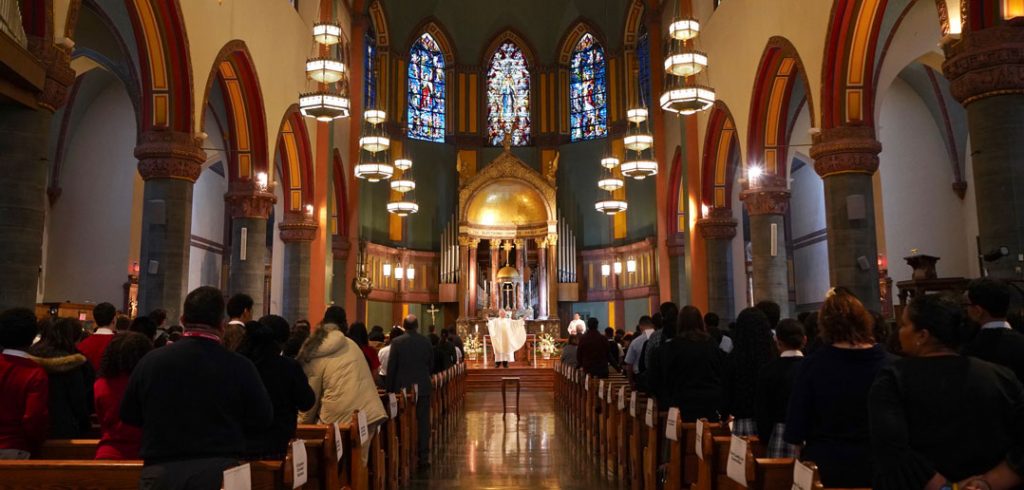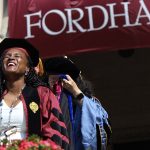
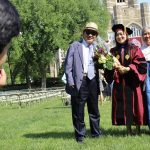
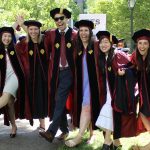


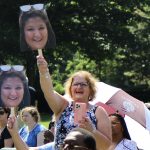
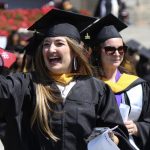

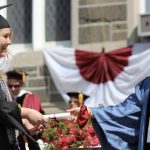
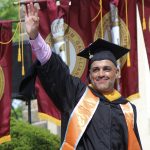
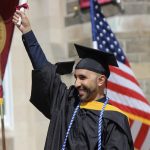
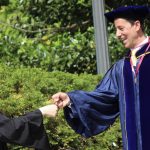
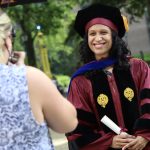
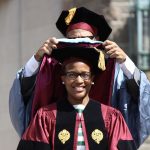
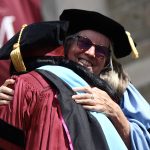 After a year-plus in which schools have faced immense challenges—and in which the need for compassionate educators has become even more pronounced—Fordham conferred degrees on 265 master’s, doctoral, and certificate students of the Graduate School of Education on Sunday.
After a year-plus in which schools have faced immense challenges—and in which the need for compassionate educators has become even more pronounced—Fordham conferred degrees on 265 master’s, doctoral, and certificate students of the Graduate School of Education on Sunday.
On a hot May afternoon, about 160 candidates walked in person, with their families and loved ones cheering from Edwards Parade. Following the graduates’ procession, Jane Bolgatz, Ph.D., associate dean for academic affairs and associate professor of curriculum and teaching at GSE, introduced Joseph M. McShane, S.J., president of Fordham, for an invocation, and GSE Interim Dean Akane Zusho, Ph.D., who addressed the graduates. Present in the crowd were Virginia Roach, Ed.D., former dean of GSE, and José Luis Alvarado, Ph.D., who will lead the school as dean beginning July 1.
“How we emerge from challenges helps to define who we are as human beings,” Zusho told the crowd, citing not only the COVID-19 pandemic but ongoing conversations around racial justice and education reform. “We need teachers, leaders, counselors, and psychologists who share in the fundamental belief that we can all learn and grow, and who can help their students, teachers, and clients live up to their fullest potential.
“Every student deserves to learn in an environment that encourages them to take risks, ask big questions, and make mistakes. Every student also deserves to know they are in a safe space where there is always a path to redemption through education, free of judgement. And that path begins with you.”
Students graduating across GSE’s degree and certificate programs echoed Zusho’s call for the need to change the world through education.
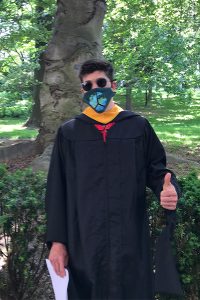
Brandon LaBella, who received a master’s degree in childhood education and is currently teaching fourth grade at Hillcrest Elementary School in Peekskill, New York, said that the M.S.T. program “made me feel so much more confident as a teacher. It’s incredible to be here surrounded by so many brilliant people, and I think everyone here is going to help make the world a better place.”
Speaking about what it’s been like to teach throughout the pandemic, LaBella added, “It’s been incredible to see the resilience of the students and all the teachers. It just gives me hope for the future that if we can take care of this, we can do anything.”
Darlyn Smith received her master’s in childhood special education through GSE’s online program and is currently teaching first grade at the Pingry School in Short Hills, New Jersey.
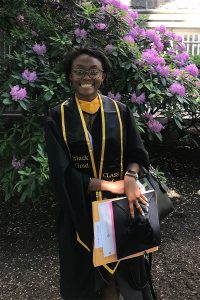
“I’ve always wanted to be a teacher, since I was very young,” said Smith. “It’s a great feeling to be here and get to see all the friends that I had online and get to interact and celebrate this wonderful occasion.”
Others reflected on the personal journeys of their years in graduate school. Teddy Reeves received his administration and supervision Ph.D. in GSE’s church and non-public school leadership program, and he said that the research process, while challenging at times, was an essential complement to his work as the curator and co-lead of religion at the National Museum of African American History and Culture in Washington, D.C.
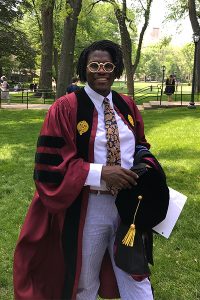
“It has been an amazing, difficult season of writing and researching and finding self,” Reeves reflected. “It’s labor intensive, but it’s a labor of love. It’s been great to mirror the work that I do professionally with the work I got to do at Fordham.”
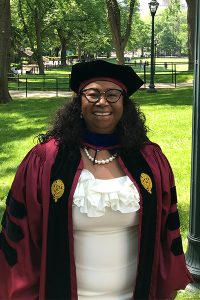
Magalie Exavier-Alexis, who completed her Ed.D. in educational leadership, administration, and policy while working as a school principal in Brooklyn’s District 13, also noted the challenges of balancing classwork and research with full-time work and a family, but she had no doubt that it was worth the effort.
“I’ve always known that my goal is to cross this finish line,” she said of receiving her doctorate. “I am elated! There are no words to describe my elation and my jubilation.”
Many graduates opted to attend GSE’s virtual ceremony, held on Monday, May 24. View the ceremony below and on YouTube.
]]>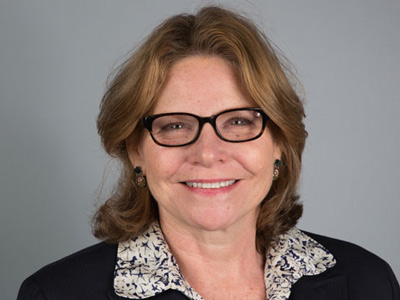
“I am so proud to have been a member of Fordham University for the past five years and of all that we in the Graduate School of Education have been able to accomplish,” said Roach. “While I am moving on to a new challenge, my fondest thoughts will always be with Fordham and the wonderful faculty, staff, and students who have dedicated their lives to making the world a better place.”
During her tenure, Dean Roach has helped the school grow in national standing and reputation. She helped launch all eight of the graduate school’s fully online degree programs. Roach also worked with faculty to rebuild the Hagin Assessment Center, which offers consultation and assessment services to support academic achievement for students. Her catalytic efforts to support faculty grant writing has led the Graduate School of Education to triple its sponsored research funding in just the past four years. In each of the last two years, U.S. News has ranked Fordham 39th among the nation’s top graduate schools of education nationwide, its highest ranking to date.
“Dean Roach is an extraordinary leader in every way,” said Dennis Jacobs, Ph.D., provost and senior vice president for Academic Affairs at Fordham University. “In addition to strengthening the School’s degree programs and scholarly endeavors, she has worked tirelessly to promote diversity, equity, and inclusion and advance Fordham’s Jesuit mission. From creating pipelines for first-generation students exploring college, to recruiting increasingly diverse full-time faculty and students, Dean Roach has left an indelible mark on Fordham’s Graduate School of Education.”
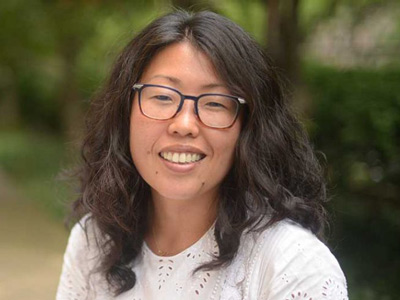
Dr. Zusho previously served as the chair of the Division of Psychological and Educational Services and is an award-winning scholar at the intersection of culture, achievement motivation, and self-regulated learning. Fordham University will commence a national search this fall for the next dean of the Graduate School of Education.
]]>“We are of course pleased that Diverse: Issues in Higher Education Magazine has chosen to honor Dean Roach and Professor Greer,” said Joseph M. McShane, S.J., president of Fordham. “Their scholarship, and their contributions to the life of the University and the public discourse, are numerous and invaluable, and we join Diverse in saluting them.”
Roach became dean of the Graduate School of Education in July 2015. At Fordham, she has supported faculty research, strengthened the University’s relationship with the local community, and diversified the student and faculty populations. In her nearly five years as dean, the school’s research portfolio has grown four-fold. Her own research focuses on educational reform, especially in special education and women’s leadership development. Roach has also mentored many women through career counseling, conducting mock interviews, and helping them to identify and pursue their career goals. In addition, she helped create an annual program that hosts hundreds of middle school students from New York City Catholic schools at Fordham to help them envision themselves on a college campus. In a 2015 Fordham News Q&A, Roach spoke about the importance of “the whole child, not just the test score number.”
Roach began her career as a special education teacher, and went on to serve as dean of the Graduate School of Education at Bank Street College, associate professor and department chair at The George Washington University, and deputy executive director of the National Association of State Boards of Education. In addition, she has served as editor of Educational Planning from 2009 to 2011 and as a board member for the International Society of Educational Planning, the United Nations International School, and the Carnegie Project on the Educational Doctorate.
Greer has worked at Fordham for more than a decade. Her research and teaching primarily concentrates on racial and ethnic politics, American urban centers, presidential politics, campaigns, and elections. She has often offered political advice and commentary to the campus community, including a podcast primer on the 2017 New York City elections and, most recently, a short video explaining what’s at stake in the 2020 U.S. census. She is also a frequent political commentator for media outlets like MSNBC and NY1, and is often quoted in media outlets including The New York Times and The Wall Street Journal.
She was the 2018 Fellow for the McSilver Institute for Poverty Policy and Research at New York University’s Silver School of Social Work, where she broadened the conversation about issues including inequality, social, and racial justice. In 2014, she was named to City & State’s Class of 2014 “40 Under 40 Rising Stars,” which honored 40 individuals under age 40 who work in New York City government, politics, and advocacy. That same year, she was awarded the W.E.B. Du Bois Distinguished Book Award from the National Conference of Black Political Scientists for her book Black Ethnics: Race, Immigration, and the Pursuit of the American Dream. She is also the co-host of the New York-centered podcast FAQ-NYC; the producer and host of The Aftermath and The Contenders on Ozy.com; an author and narrator for the TED-Ed educational series; and the author of a weekly column for The Amsterdam News, one of the oldest “black-owned and -operated media businesses” in the U.S.
]]>

 Hundreds of middle school students made their way to the Lincoln Center and Rose Hill campuses on Jan. 27 and 28, respectively, for Mass, a campus tour, and pizza delivered straight from the University kitchen. For the fourth year in a row, they celebrated National Catholic Schools Week at Fordham, thanks to the Graduate School of Education, its Center for Catholic School Leadership and Faith-Based Education, and generous support from alumna Christine Fiorella-Russo, GSE ’59; her spouse Victor D. Russo; and her brother Anthony J. Fiorella.
Hundreds of middle school students made their way to the Lincoln Center and Rose Hill campuses on Jan. 27 and 28, respectively, for Mass, a campus tour, and pizza delivered straight from the University kitchen. For the fourth year in a row, they celebrated National Catholic Schools Week at Fordham, thanks to the Graduate School of Education, its Center for Catholic School Leadership and Faith-Based Education, and generous support from alumna Christine Fiorella-Russo, GSE ’59; her spouse Victor D. Russo; and her brother Anthony J. Fiorella.
“This is a way for Fordham to celebrate the theme of this year’s National Catholic Schools Week, Catholic Schools: Learn, Serve, Lead, Succeed, encompassing the core values that can be found in the schools of the Archdiocese,” said Gerald M. Cattaro, Ed.D., director of the Center for Catholic School Leadership and Faith-Based Education.
For many of the approximately 800 children from 19 different Catholic schools across New York City, it was also an opportunity to see a college campus for the first time.
“By giving them the opportunity to visit classrooms, see college students in classes, and walk the same paths as college students, we hope to inspire these visiting students to reach higher in their academic choices and study habits,” said Virginia Roach, Ed.D., dean of GSE. “We want to show children, especially those who could be first-generation college-bound students, that there are pathways to realize their dreams of a college education.”
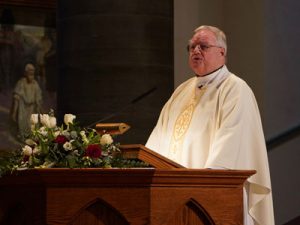
Shortly before 10 a.m. last Monday, students started to arrive at the Church of St. Paul the Apostle, located across the street from Fordham College at Lincoln Center. For the next hour, they sat in the wooden pews and attended morning Mass. They sang hymns like “Here I Am, Lord” and “City of God,” led by choir singer t’Jacques Guillot, a Fordham College at Rose Hill senior, and Timothy Perron, a Fordham Jesuit scholastic and pianist. At the beginning of Mass, they were reminded of one of Fordham’s guiding tenets:
“At Fordham, we’re committed to the idea of cura personalis. That’s Latin for caring for the individual. We really care deeply about you and supporting you today, tomorrow, and after you graduate,” Anthony P. Cavanna, Ed.D., associate dean for academic affairs at GSE, said to the students. “No matter what college or high school or university you finally choose, you map out cura personalis. Take care of yourself, take care of others, and God bless you.”
Presiding over Mass was Joseph M. O’Keefe, S.J., a scholar in residence at GSE and the first provincial of the newly created USA East Province of the Society of Jesus. He urged the students and teachers to continue to care for one another in “one family of faith and goodness and hope.”
Today, he said, they were celebrating the feast of Saint Angela Merici—a religious educator who was dedicated to the education of girls.
“When Catholic schools only taught boys, she said Catholic schools should educate girls, too. Girls, you think that’s a good idea?” he said to applause. “Absolutely … so we gather to celebrate Catholic schools and remember the heroes of Catholic schools like Angela Merici.”
After Mass, the students split into two groups. Half of them toured the Lincoln Center campus; the other dined on pizza in Pope Auditorium with Joseph M. McShane, S.J., president of Fordham.
For Isabella Marina Martinez, an eighth-grader at Our Lady Queen of Martyrs in Washington Heights, it was her first time at Fordham College at Lincoln Center. This past spring, she visited her cousin, Xienna Dejesus, a student at Fordham College at Rose Hill, at the Bronx campus.
“I’ve seen it in pictures, and I wanted to see it [in person], so she took me one day,” said Martinez, who said she’s considering a future as a lawyer—and keeping an eye on the Fordham School of Law. “It would be cool to come here.”
For half an hour, Martinez and her classmates explored the Lincoln Center campus, including Hughes Hall. It was Matthew Capellan’s first time seeing a trading room with Bloomberg terminals. It was also a special experience for his classmate, Manuel Ramirez.
“The part that I found most interesting about the tour today was the business room—how they had all the stocks going around on the screens and how every computer is updated to the most recent stocks,” said Ramirez, who lives in Morris Heights and wants to become a biologist.
Nisha Reyes, an eighth-grader who wants to study business or law, said she was struck by the number of student clubs and overall diversity.
“Everyone’s so different, but they come together in such a special way at Fordham,” Reyes said. “It doesn’t matter where you come from. You can still come together; everyone can be part of a family at Fordham.”
]]>“I was in a job that I enjoy,” said McIntosh, the assistant superintendent of curriculum, instruction, and assessment at Scarsdale Public Schools. “I didn’t necessarily need to go for a doctorate—it was aspirational.”
While the degree would help him with his career, McIntosh said he didn’t think pursuing a doctorate was something he could do, until he met Toby Tetenbaum, Ph.D., a professor in Fordham’s Graduate School of Education (GSE).
“She was really the tipping point in many ways,” he said. “She just kind of gave me this sense of confidence, not only that I should do it but that I could do it. She just kind of looked in my eyes and said, ‘you can do this.’”
Her charisma, generosity, humor, and honesty have helped him even when he felt like he was struggling.
“I was waffling between my topics (for my dissertation) and every class she would say, ‘plant the flag Edgar! Plant the flag,’” McIntosh recalled. “She quite literally changed the course of my life.”
Tetenbaum, a licensed psychologist, touched the lives of hundreds of students over her 45 years with the University, where she held teaching roles in both the Division of Psychological and Educational Services and the Division of Educational Leadership, Administration and Policy at GSE.
But McIntosh, who is on track to complete his doctoral program in May 2020, will be one of her last. At age 80, Tetenbaum, is preparing to retire.
“I’m proud of probably having over 1,000 doctoral student mentees—I have 8 to go,” she said. “The best part of my job is seeing these people grow. My reward comes from an email that says, ‘thanks to you and the program, I got promoted,’ or ‘I got the job I was looking for.’”
Lasting Legacy
Tetenbaum’s legacy at Fordham almost didn’t happen. She got her Ph.D. in educational psychology at New York University (NYU) in 1974 and had been working as an adjunct professor at NYU and City College of New York (CCNY), when she heard about a full-time opening in GSE. She was hesitant at first, but her mentor suggested she go for the interview.
Tetenbaum followed her mentor’s advice, got the job, and stayed for more than four decades. She credits the connections she has made with her students as the main reason she stayed so long.
Grant Grastorf, Ph.D., GSE ’18, is one of those students who stays in touch with his mentor.
“One of Toby’s best traits is staying in touch after graduation,” said Grastorf, the academic operations administrator at Fordham’s Westchester campus. “Toby continues the relationships with her students by remembering special occasions like birthdays, hosting gatherings at her house for her former students—holiday parties and summer pool parties, meeting for lunch just to get caught up, and letting you know that you’re special. She always asks how you’re doing.”
Virginia Roach, Ed.D., dean of GSE, said Tetenbaum has left an impact on many former students.
“She’s had a substantial impact on the careers of many people who have gone on [to success]in the greater metro area and beyond,” she said. “She will be missed.”
A Different Start
Tetenbaum got her bachelor’s degree in 1960 in psychology from Hunter College and started teaching in elementary and middle school. She soon realized she needed a different challenge.
“I said, ‘no, no I can’t do this—I need to work with adults,” she said.
She received her master’s in education from CCNY in 1970, before going for her Ph.D. at NYU.
Since then, during her career at Fordham, Tetenbaum has taught and conducted research in organizational behavior, chaos theory in leadership, creativity and innovation in organizations, and women in leadership.
One of her biggest accomplishments was designing, implementing, and running a human resource master’s program at GSE for 20 years.
“The students from that master’s program are still a community that give one another jobs, so they’ve stayed in touch, which I think is a really good mark of the program,” Tetenbaum said.
An Evolving World
During her time at Fordham, Tetenbaum said she’s seen the world, particularly the business world, change dramatically.
“We talk a lot about the ‘VUCA’ world, which is volatile, uncertain, complex, and ambiguous. Students need to learn how to manage themselves and manage people in a VUCA world,” she said.
Tetenbaum saw those changes up close, working for more than 20 years as a trainer, coach, and consultant for corporations. She helped them integrate company cultures, evaluate their programs, and develop talent management systems. She said her experience in the industry helped her as a teacher and gave her students a leg up.
“I can bring the real world into my academic world, and I can bring the theories and models of my academic world into the business world,” she said. “It was a nice mesh, and my students appreciated it.”
During her time coaching and consulting, Tetenbaum said she’s seen an increase in the amount of companies investing in emotional intelligence, or “people skills.”
“Workers were technically skilled, but when they had to join teams and work with other people they weren’t as skilled,” she said. “The company said, ‘we have to do something about this,’ and that’s why emotional intelligence, which would never two decades ago have been in business arenas, is very big in all of them.”
Supporting Women
Despite the longevity of her career, Tetenbaum said it hasn’t always been easy, particularly when she first started as the only woman in her department.
“When I came, it was very patriarchal,” she said. “Maybe in retrospect, no worse than any other place.”
She’s focused a lot of her time and effort on mentoring women and studying female leadership.
“Women do not have a lot of female mentors; we want to see how executive women handle issues in the workplace but there aren’t that many executive women to look up to to find those cues,” she said.
Because of her work, Tetenbaum was asked to lead a workshop on “imposter syndrome” at Fordham’s Women’s Philanthropy Summit held on Oct. 23.
Tetenbaum described the syndrome as often “feeling you’re fooling people—it’s not genuine that you have succeeded.” She said that she even felt it during that session.
“I found out I was doing my workshop in this room … with three screens, and although I’ve done tons of presentations in my 50 years in academia and in business, I got totally intimidated,” she told her audience.
Tetenbaum called on those in attendance to continue to push against challenges and not wait for those in power to make changes.
“I think it’s one of the reasons I never liked the term ’empowerment’—that we empower you,” she said. “Because in all honesty, whatever you’re being empowered to do is minimal, whoever empowered you still holds the power.”
She said she hopes one of her lasting legacies will be encouraging women to take matters into their own hands and fight through the “imposter syndrome” so they can succeed.
“You want to advance your career, you step up,” she said. “One of these should be your mantra —I don’t care whether it’s lean in, step in, or just do it—when you face those barriers.”
One of her current doctoral students, Sarah Ruback, said that Tetenbaum has served as a mentor for her and has inspired her to push herself.
“I want to make her proud,” said Ruback, director of professional development and leadership at St. Christopher’s Inc., a nonprofit agency that serves at-risk adolescents in Westchester and Orange counties in New York. “There are people who come in and change the trajectory of your life and I think she’s that person.”
Encouraging Innovation in Academia
Tetenbaum also said she wanted to leave behind a message of encouraging people across academia to embrace innovation.
“We need more academics who are innovative, creative, looking to the future,” she said.
Roach said that Tetenbaum’s vision for the future has helped guide the department forward and will be a part of her legacy at the university.
“She has been a futurist—looking at the futurist literature and what implications that had for education and training,” Roach said. “It’s that sort of level of thinking into the future that is a gift from Toby and something that we will continue.”
While she’s preparing to leave her full-time position, Tetenbaum’s not done working just yet. She’ll be teaching classes as an adjunct at the University of Connecticut-Stamford campus and Sacred Heart University in Fairfield, both closer to her home in Greenwich, Connecticut, while continuing her work as a consultant and coach for businesses.
As she prepares to say goodbye to the university she called home for more than four decades, Tetenbaum said she hopes her students can carry on her lessons.
“I hope I leave behind a large group of committed, dedicated educators and business people who care about their work, but more so the people around them with whom they work,” she said.
]]>“Being ranked as a 2019 Best Online Program is a testament to the caliber of teaching at Fordham, and underscores the enthusiasm of our professors to deliver top educational leadership and teaching courses through alternative pathways,” stated Virginia Roach, Ed.D., dean of the Graduate School of Education.
Read the full story on GSE News.
]]>
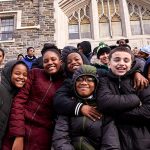
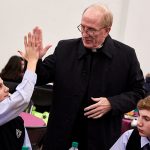
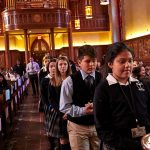
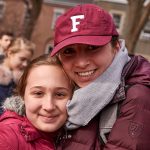
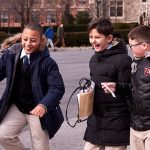
 More than 1,500 middle school students from Catholic schools across New York City convened at Fordham on Jan. 28 and 30 for Catholic Schools Week. The Graduate School of Education hosted the students at Rose Hill and Lincoln Center for Mass, a pizza lunch, and campus tours.
More than 1,500 middle school students from Catholic schools across New York City convened at Fordham on Jan. 28 and 30 for Catholic Schools Week. The Graduate School of Education hosted the students at Rose Hill and Lincoln Center for Mass, a pizza lunch, and campus tours.
Many of the middle schoolers are students of color who will be the first in their family to attend college, said Virginia Roach, Ed.D., dean of the Graduate School of Education. Exposure to college life can help set them on the right path, she added.
“Researchers have found that implicit sorting of children into college-bound and non-college-bound groups begins as early as middle school,” Roach said. “By hosting these children on campus, we hope to reinforce that they all can be college-bound by seeing themselves on our campus and envisioning their future at Fordham or other colleges or universities.”
Linda Dougherty, FCLC ’79, regional superintendent of Catholic schools in the Northeast Bronx, said it was especially important for the young Bronxites to see Fordham.
Right in Their Backyard
“This is a great way for them to see what’s right in their backyard,” she said. “You have an excellent university right here in the Bronx.”
At the beginning of the week, more than 1,000 students congregated at the Rose Hill campus for late morning Mass at the University Church, lunch in the McGinley Ballroom, and a 25-minute tour across campus.
Hundreds of little heads bobbed above the pews at Mass. The students, wearing their Catholic school uniforms and winter jackets, sang along to hymns like “I Want to Walk as a Child of the Light.” At the end of Mass, Joseph O’Keefe, S.J., had a few words for them.
“One of the wonderful things about Catholic schools is it gives all of us a second home,” Father O’Keefe said. “Look around this church. Think of your goodness and talents and gifts and, yes, use them to have a happy life. But [also]use them to do the will of God—to bring healing and hope and comfort, and to bring love to all of those people that God put into your life.”
Campus Tours
After Mass, Fordham student-athletes shepherded the students to some select locations on campus: Hughes Hall’s trading room with Bloomberg terminals; the Jack Coffey Football Field; the Rose Hill Gym, home to the oldest Division I basketball facility in the country; and the Edgar Allan Poe Rock.
“It’s a special rock,” said Katie McLoughlin, FCRH ’21, one of the student tour guides.
“Dwayne Johnson?” joked one of the middle school students.
As they drew closer to the rock—a tribute to the famed American writer who moved into a three-room cottage near campus and befriended several Jesuits at Fordham—McLoughlin continued her story.
“Rumor has it that the University Church’s original bell was the inspiration for Poe’s haunting poem ‘The Bells,’” she explained. “So he has a lot of presence on the campus. And to honor him … he has a rock!”
The middle schoolers giggled. “That’s awesome!” one quipped.
Others were more impressed by Rose Hill’s ambiance. Derek De La Hoz, a seventh-grader at Saint Clare of Assisi, said his sibling lives in Faber Hall. He recalled the first time his big brother gave their family a tour of the undergraduate campus.
‘It’s So Peaceful’
“It was like paradise. It’s so peaceful,” said the younger De La Hoz, who said he lives in Country Club, a mixed-income neighborhood in the Bronx. “You can hear the birds chirping.”
The day ended in the McGinley Ballroom, where students were treated to a slice of pizza and a plastic zipped file folder filled with a Fordham adhesive card holder, a printout of Edgar Allan Poe’s poem “The Bells,” and a sheet explaining the Science and Technology Entry Program (STEP), Fordham’s enrichment program for middle and high schoolers.
“Make sure you come here for college, alright?” said Joseph M. McShane, S.J., president of Fordham, to a group of students from Sts. Philip and James School. “We’re your neighborhood school.”
Isabella Batista, a wide-eyed sixth-grader at Saint Clare of Assisi, was sitting in the ballroom with her classmates.“This school is so big,” she said. “I went to the buffet and I can’t believe when you’re in college, you get to eat anything you want.”
Batista said she has a cousin who is currently enrolled at Fordham and loves it. Someday, Batista might apply here. But for now, like the rest of the students who visited Fordham this week, she said she’s taking things one step at a time.
“I think college is about getting ready for when you’re all grown up,” Batista said. “And starting your own life.”
]]>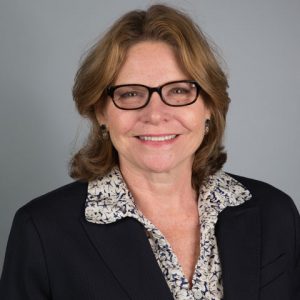
When Stephen Freedman died suddenly in July, he left behind a profound legacy as Fordham’s first provost. Finding someone to succeed him will be a significant task.
Virginia Roach, Ed.D., dean of Fordham’s Graduate School of Education, said the University hopes to honor Freedman’s memory by finding a replacement who can build on his initiatives and chart an ambitious path forward for the University.
Just as Fordham was vastly different when Freedman joined Fordham in 2007 than it is today, so too has the job changed. Roach, who is chairing the committee tasked with searching for a replacement, said that expanding on some of the innovative programs that Freedman spearheaded will be key, but otherwise, the committee is keeping a very open mind as to what sort of candidate could serve Fordham well in an evolving higher-education landscape.
A Search Unencumbered by Borders
Taking its cue from Joseph M. McShane, S.J., president of Fordham, the committee is also very open to input from the Fordham community and beyond, Roach said.
“When Father McShane asked me to chair the search committee, he was adamant that his goal was to have the best provost for Fordham that we can find, even if it’s someone outside of the country if there’s an appropriate match,” she said.
“He certainly has no preconceived notion of who’s going to come, or what they look like, or what background they have. He’s very reliant on the committee to help shape that and to bring forward really strong candidates.”
The process of hiring the University’s new provost—its chief academic officer—kicked off this month on several fronts. A job listing was posted on the University’s website, and the search firm Witt Kieffer was enlisted to recruit potential candidates.
At the same time, a 13-member search committee, chosen by Father McShane after consultations with the Faculty Senate, has begun to solicit feedback from the Fordham community. Roach said the goal of the outreach is to help it settle on parameters to winnow the list of candidates down to a list of semifinalists and finalists. The due date for applications is October 29.
Unvarnished Opinions Welcome
In addition to public forums, the committee has also set up an email account for feedback. The account, [email protected], is overseen by the Witt Kieffer, and feedback is passed along anonymously to the committee. That measure of protection is meant to ensure that the committee gets unvarnished, honest feedback.
“Many people in these forums have given us really great feedback and input, but some people feel more comfortable providing feedback anonymously. We want people to feel like they can say whatever they want to say regarding the search, the email address provides that opportunity,” Roach said.
When it comes to the future provosts’ qualifications, Roach said several aspects of the job are particularly relevant. International endeavors, such as the partnership that Freedman established with the University of Pretoria, will continue to be important, as will exploration of new learning modalities such as online learning. Maintaining Fordham’s reputation as a nationally recognized center for research is key as well.
A One-of-a-Kind Opportunity
Finally, there is the University’s unique tripartite identity.
“Anyone who comes here should know what it means to be a Catholic university, what it means to be a Jesuit university, and what it means to be a university in New York City,” Roach said.
Ultimately, no less than a visionary leader will suffice for the job, she said. The University has an aggressive timetable laid out: the new provost is expected to be announced in January, and to start in September, 2019.
“The reality is, no institution of higher education can stand still. We always have to think about what the challenges are today and tomorrow, and what the profile of a learner is in 2018 and into the future. There are very different ways people acquire information, and very different ways in which people are integrated into the community. All of that is something a provost has to think about, as well as the larger issues, both here in the United States and around the world,” she said.
“We want to hear from the community, and we desperately need people to be aggressive in talking to others they know in the field to encourage recommendations for ideal candidates our search firm can pursue. We’re a complex, sophisticated, nationally ranked institution. I think it’s an attractive challenge.”
]]>The Master of Science in Teaching (M.S.T.), which will commence on May 26, is geared toward educators who want to earn their initial teacher certification from the comfort of their own home. The application deadline for the first cohort is March 26.
The degree, which is delivered in partnership with 2U, Inc., features two tracks:
Childhood Education: For aspiring teachers who want to work with elementary-school-age children. Students complete a curriculum exploring child development, instructional practices for inclusive elementary classrooms, and professional studies. This track comprises 36 credit hours and can be completed in two years. Successful completion leads to initial teacher licensure in the state of New York.
Childhood Special Education: A dual-certificate degree that prepares educators to teach children with disabilities in grades 1-6. Classes and coursework blend instruction in child development, adaptive instructional practices for children in all settings, and professional studies. At 45 credit hours, it can be completed in just over two years. Successful completion of leads to an endorsement for the New York State teacher certification as a childhood teacher and teacher of children with disabilities in childhood education.
For both tracks, students will complete in-person field experiences in which they will apply classroom learning to their local communities, with the support of on-site mentor teachers and GSE faculty member.
The degree was created to address a shortage of teachers for childhood education in New York City public schools, and a shortage of special education teachers in 46 states and the District of Columbia that the U.S. Department of Education documented in June, 2017.
Virginia Roach, dean of GSE, said the degree shows the colleges’ dedication to providing more equity and access to students.
“We’re excited and ready to use our resources to deliver high-quality online education to respond to the state’s and country’s need to prepare more adept teachers,” she said.
“We want our graduates to be forces of positive change with their students, in their schools, and in their communities.”
]]>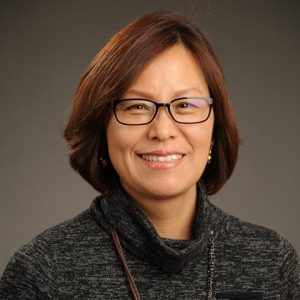
The Graduate School of Education’s (GSE) Division of Curriculum and Teaching will receive $1.25 million in funding from the U.S. Department of Education’s Office of Special Education Programs (U.S. DOE – OSEP) for Project PACTS (Preparing Affirmative Collaborative Teachers and School Psychologists for Students with High-Intensity Intervention Needs in Elementary Schools).
Under the leadership of project director Su-Je Cho,Ph.D., associate professor of curriculum and teaching, the 10 Fordham faculty members and supervisors implementing the project will help address the issue of demonstrated existing shortages of highly trained, qualified special education teachers and school psychologists in the field. Even more specifically among school psychologists, there is a chronic shortage of those who are bilingual.
To address these critical needs, Project PACTS will prepare a total of 35 scholars in two cohorts over a five-year period. Of those, Dr. Cho expects that 27 scholars will work on earning a Master of Science in Education (MSE) degree with a New York State (NYS) certification in Students with Disabilities for Grades 1-6, and eight will earn certification in School Psychology with a Bilingual Extension. Tuition support from the Graduate School of Education and the grant will fund approximately 70% of costs for special education degree candidates and approximately 50% of costs for the school psychology scholars.
Upon completing the program, graduates will be expected to demonstrate the practical knowledge, skills, and dispositions necessary for productive work related to their respective certificates and degrees as well as collaborative work with professionals in related fields.
“This is exactly the kind of structured interdisciplinary program needed to provide vital training for teaching and psychology professionals who are faced with more and more young children in classrooms with extensive learning needs,” said GSE Dean Virginia Roach.
“Our goal in preparing GSE graduates in this way is to make a meaningful impact on their professional skills that will in turn result in significant positive outcomes for the students they teach.”
Overall, the program’s five segments will provide targeted, interdisciplinary learning to aid scholars in becoming effective collaborators in designing and supporting focused instruction and intensive individualized interventions for New York City (NYC) elementary students with high-intensity needs. In addition, scholars will become skilled in behavioral interventions based upon the framework of Positive Behavior Interventions and Supports (PBIS) and Functional Behavior Assessment (FBA). PBIS is a proactive approach to establishing behavioral supports and social culture needed for all students in a school to achieve social, emotional and academic success. Functional behavioral assessment (FBA) is a set of procedures developed to ascertain the purpose or reason for behaviors displayed by individuals with severe cognitive or communication disabilities (e.g., individuals with autism).
]]>“GSE is committed to excellence and meeting the highest standards in the professional education of teachers, school leaders, school counselors and psychologists,” said Virginia Roach, Ed.D. dean of the Graduate School of Education.
“Our goal is to ensure that every child, young adult, family and professional with whom our graduates work receive the very best educational, psychological and counseling services. The seven-year renewal of our national accreditation, meeting all standards and moving toward target in standard 2, is yet another affirmation of this commitment.”
The NCATE report specifically highlighted GSE faculty, saying they are “qualified and model best professional practices in scholarship, service, and teaching, including the assessment of their own effectiveness as related to candidate performance; they also collaborate with colleagues in the disciplines and schools. “
Providers accredited based on NCATE standards, as well as those accredited based on the Teacher Education Accreditation Council (TEAC) Quality Principles, are now served by the single specialized accreditation system for educator preparation in the United States, the Council for the Accreditation of Educator Preparation (CAEP). More than 840 educator preparation providers participate in the CAEP accreditation system.
]]>